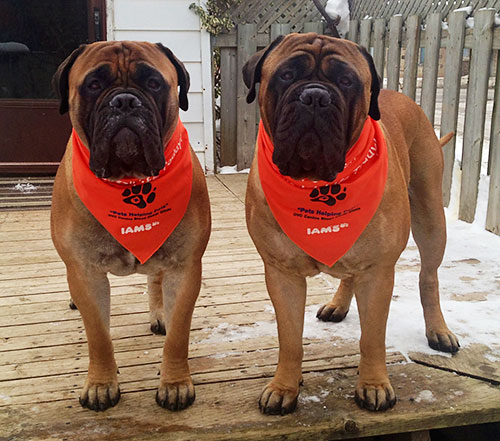
Declan and Marquee’s recent visit to the Ontario Veterinary College’s (OVC) Companion Animal Hospital wasn’t to receive treatment; it was to give something that might help save the lives of other pets: the two bullmastiff dogs came in to donate blood as part of the OVC blood donor program.
Last year, about 300 units of blood were given to cats and dogs during life-saving surgeries at the hospital. Fortunately, the blood was there when they needed it, thanks to the program.
There are currently about 50 dogs in Guelph and the surrounding area who are registered blood donors, which is a little short of the program’s goal.
“We would like to have about 65,” says Registered Veterinary Technician Ramona Fowler, who runs the program. “We are currently short on dogs with the A- blood type, so we are really hoping more people will sign up.”
After applying, dogs receive a complete check-up before becoming a donor. They give blood about once every two or three months, and donate about 450 grams of blood each time — about the same as a human blood donor. The process takes about an hour.
“We’ll take a small amount of blood first just to test it,” says Fowler. “Then we shave an area of the dog’s fur, freeze the skin with a cream, and take the blood. A few of the dogs get a tiny bit of sedation, but most are happy to lie there and get belly rubs and cookies.”
She adds: “If a dog finds this scary or stressful, then he’s not suitable for the program.”
Cat blood donors belong to OVC and are fostered with families in the community, often faculty or students. They give blood about once a month.
Canine blood donors receive special benefits for their contributions: a free yearly blood screening and heartworm test, plus preventative heartworm medication; a free bag of dog food and dog treats at each donation; and a free nail clipping.
“This can be a real cost savings for the families,” says Fowler. “We do hope for a two-year commitment, but we recognize that dogs may need to leave the program for a variety of reasons. That’s one reason we are hoping to have more people come in to see if their dogs are suitable.”
Could your dog be a blood donor? Here are the requirements:
• The dog needs to be at least a year old.
• The dog should weigh at least 25 kilograms (55 pounds).
• The dog should be happy, healthy and easygoing in temperament.
• The dog doesn’t have any surgical implants.
• The dog should be fed a cooked or kibble diet.
Mixed breeds and purebreds are both welcome. Dogs from large breeds are considered too old to be in the program at age seven, and giant breed dogs need to retire from donating blood at age six. Owners also need to be available to bring their dogs to the small animal hospital during weekdays. For more information, visit the blood donor program web page.